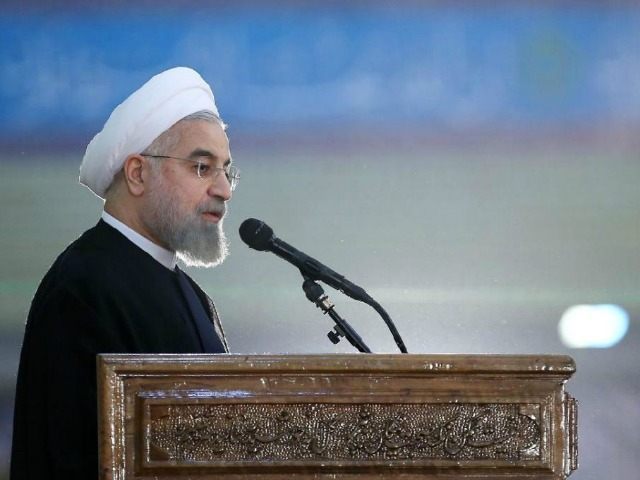Only a few days remain before the June 30th deadline for a comprehensive agreement between Washington and Tehran on the latter’s nuclear program is to be reached. The defining issue remains Iranian intentions. While U.S. negotiators have struggled with intelligence assessments to gain a clearer focus on this, a document stating those intentions, in the mullahs’ own words, is overlooked—Iran’s constitution.
It is this document that reveals what the mullahs perceive to be their divine mission—one entrusted to them by Allah. It is a mission having drastic international repercussions.
Unlike constitutions of all other nations of the world community, Iran’s gives its government an extraterritorial reach. This constitutional “long arm” mandates global exportation of the same Islamic Revolution that brought the mullahs to power in 1979. Allah’s call to them is: how goes Iran, so too must go the rest of the world.
The extent to which the mullahs take this mandate is underscored elsewhere in their Constitution.
As does our own, Iran’s Constitution provides for the succession of its top leader in the event his term is unexpectedly cut short. Like ours, it cites death or incapacitation of its top official (for Iran it is the Supreme Leader) as two causes for triggering the succession clause. But, it is the third cause cited that is most telling.
An otherwise unimpaired Supreme Leader is required to surrender authority upon arrival of “the Mahdi.” Article 5 of the Iranian Constitution places full power in the hands of a faqih, or legal scholar, but only “during the Occultation of the Wali al-Asr (may God hasten his reappearance).”
Both Sunni and Shiite Muslims believe in the Mahdi or “Twelfth Imam.” The former believe he has yet to come; the latter, that he succeeded to power in the ninth century at the age of five, but then disappeared.
Shiites believe the Mahdi disappeared to enter a state of Occultation—to remain there until his future return in fulfillment of an end-of-world prophecy. His return is to be triggered by world chaos, followed by Islam’s march to world domination.
Most “Twelvers,” as such believers are called, see the triggering cause for the required world chaos as evolving naturally; however, Iran’s Shia mullahs believe man can be a catalyst in expediting it, with Israel’s destruction cited as the trigger.
Prior to the Mahdi’s permanent return to Earth, as the prophecy goes, he is to visit a selected few individuals to signal his return is imminent. Current Supreme Leader Ali Khamenei and former Iranian President Mahmoud Ahmadinejad both claim they have already been so visited.
The extent to which the Mahdi’s return permeates Iranian thinking was evident in October 2005, when then-President Ahmadinejad concluded his remarks to the U.N. with a prayer for Allah to quickly usher in his return. It was just one of many such prayers calling for the Mahdi’s return routinely delivered by an Iranian leadership who fully accept it be predicated by world chaos.
Ahmadinejad was so confident Iran would possess nuclear weapons with which to trigger that world chaos during his term in office, he reportedly made other Iranian Muslim leaders vow to work towards the Mahdi’s return while he was still president. His timetable was disrupted by the computer malware Stuxnet—jointly developed by the U.S. and Israel—severely setting back Iran’s nuclear program.
Our negotiators tend to impart rational thought to mullahs who, in reality, are driven by an irrational ideology. Thus, our negotiator tend to believe not even a nuclear-armed Iran would initiate a strike for fear of in-kind retaliation.
Such logic by them is frighteningly naïve. The mullahs have no such fear. To them, nuclear retaliation is their ticket to an afterlife in a sensual Paradise, replete with “eternal” virgins, promised by the Prophet Muhammad.
The chilling reality of Iran’s desire for a “free” world—i.e., one subject to Islamic domination—and its willingness to sacrifice total destruction in this life for the “freedom” of the next to get there is underscored in two statements by Ayatollah Ruhollah Khomeini, Iran’s first Supreme Leader:
Either we all become free, or we will go to the greater freedom which is martyrdom. Either we shake one another’s hands in joy at the victory of Islam in the world, or all of us will turn to eternal life and martyrdom. In both cases, victory and success are ours.
We do not worship Iran, we worship Allah. For patriotism is another name for paganism. I say let this land [Iran] burn. I say let this land go up in smoke, provided Islam emerges triumphant in the rest of the world.
The dots concerning Iran’s nuclear intentions are there. U.S. negotiators need only connect them to understand a deal giving Tehran access to nuclear weapons means signing a suicide pact.
Lt. Colonel James G. Zumwalt, USMC (Ret.), is a retired Marine infantry officer who served in the Vietnam war, the U.S. invasion of Panama and the first Gulf war. He is the author of “Bare Feet, Iron Will–Stories from the Other Side of Vietnam’s Battlefields,” “Living the Juche Lie: North Korea’s Kim Dynasty” and “Doomsday: Iran–The Clock is Ticking.” He frequently writes on foreign policy and defense issues.

COMMENTS
Please let us know if you're having issues with commenting.